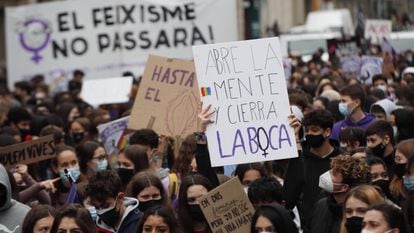Feminist demonstration on March 8 in Barcelona.Alejandro García / EFE
The long-awaited parity is delayed for another generation.
The pandemic has added 36 years to the time needed to reduce the gender gap, which has gone from 99.5 to 135.6 years in the last year.
This is stated by the World Economic Forum (WEF, in its acronym in English) in its annual report on the gender gap, which attributes the deterioration to the lower political representation of women in large economies and the stagnation of economic progress, for family care and the fact that women work in sectors most affected by confinement.
Progress towards parity has stalled in many large economies and industries and this has weighed on the global tally of progress.
Although more and more women are in skilled jobs, income disparities persist and there are still very few women in managerial positions.
So much so that economic parity, at this rate, will not be reached for another 267.6 years.
The decline in the political participation of women in the countries analyzed has also weighed heavily, where they occupy only 26.1% of parliamentary representation and 22.6% of ministries.
Closing that gap will take 145.5 years, up from 95 years in 2020.
The WEF does not hesitate to assure that the pandemic has had a more negative impact for women than for men, starting with unemployment, which, according to the International Labor Organization, has affected 5% of women compared to 3, 9% of men.
To a large extent due to the disproportionate presence of women in sectors directly affected by confinement, such as consumption.
In the case of the United States, recalls the organization that every year holds its annual meeting in the Swiss station of Davos, the most affected have been women from ethnic and racial groups in positions of worse advantage.
Not only that, but the pandemic, teleworking and confinement decreed by the authorities to deal with covid-19 has made housework, caring for the elderly and children fall mostly on women, "which has increased their stress levels and reduced their productivity levels ”.
Recovery, however, does not prioritize women.
According to LinkedIn data collected by the Economic Forum, the hiring of women is occurring at a slower pace in many industries and they are not usually the preferred candidates for management positions, "which is causing a setback after two years of progress ”, says the report, which this year reaches its 15th edition.
The report analyzes parity in four areas: economic participation, education, health, and political power.
In education and health, the gap has almost closed, but progress towards full parity has stalled in the last year.
“The pandemic has affected gender equality in both the workplace and the home, reversing years of progress.
If we want a dynamic future economy, it is vital that women are represented in the jobs of tomorrow.
Now more than ever it is crucial to focus on female leadership, commit to goals and mobilize resources to achieve them.
Now is the time to include gender parity in the recovery design, ”says Saadia Zahidi, Managing Director of the WEF.
Iceland still in the lead
For 12 years, Iceland has been the country that heads the list of countries where there is greater equality between men and women in general terms, followed by Finland, Norway, New Zealand and Sweden.
The greatest advances, however, have been recorded in Lithuania, Serbia, East Timor, Togo and the United Arab Emirates.
The covid crisis raises the gender pay gap to levels of eight years ago
The gender gap is expensive
Spain ranks 14th out of the 156 countries that make up the list and has registered a setback during the pandemic: in 2020 it had closed 79.5% of the gender gap and this year it has only reduced that difference by 78.8% .
Much of the decline has to do with the lower presence of women among parliamentary representatives - from 47.4% to 44% -, although compared to 15 years ago, when the report began, the improvement is significant since it started at 36%.
Also because life expectancy, which with the pandemic has been reduced between both genders, has hit women the hardest.
The WEF draws attention to the fact that in 81 countries a woman has never held the highest political position, as president or prime minister, including countries considered relatively progressive with respect to parity such as Sweden, Spain, the Netherlands or the United States.

